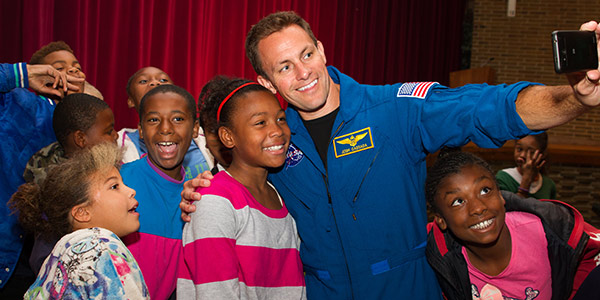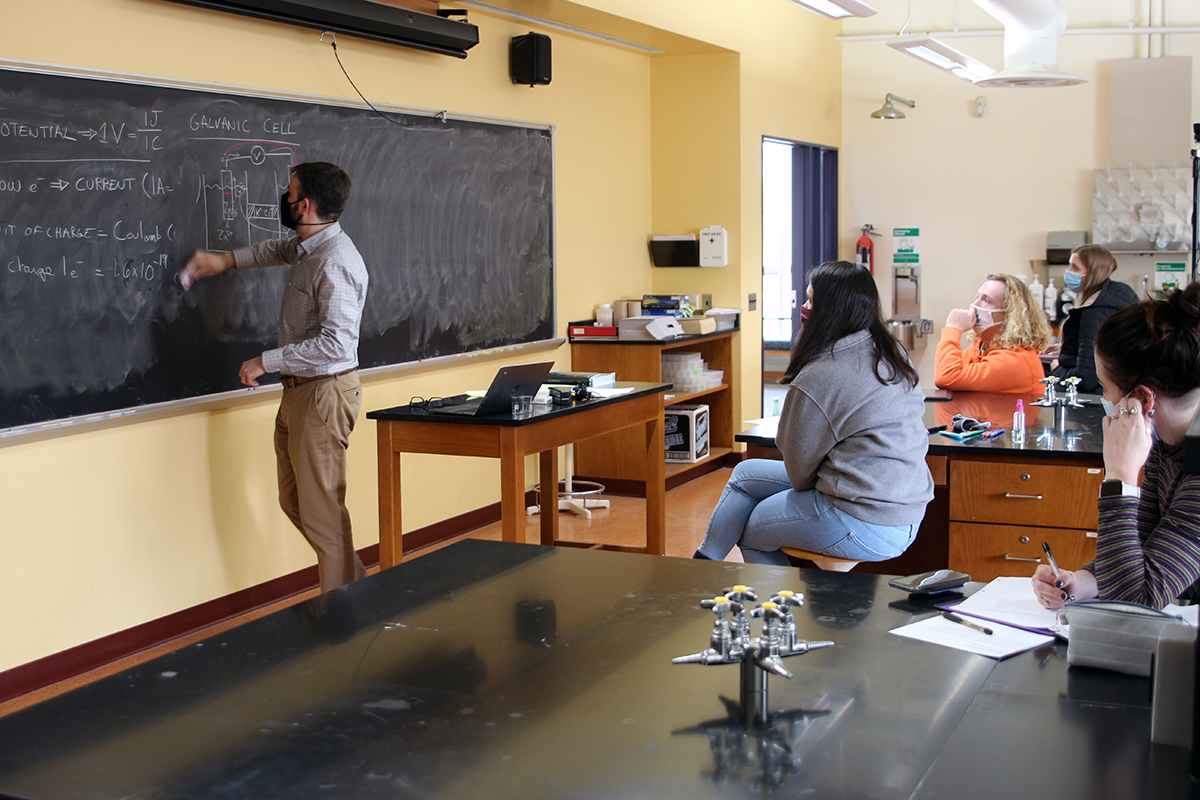For Josh Cassada, ’95, Homecoming Proves Truly Special
Related Programs
Related Posts
Connect With Us
“I'm incredibly fortunate,” says one of NASA’s newest astronauts in Albion visit.
October 19, 2015

Josh Cassada, ’95, snaps photos during his October 16 visit at Albion Community School. (Photos: Dave Lawrence)
By Chuck Carlson
The hands shot up and the questions flowed.
“How much do weights weigh in space?”
“Does weightlessness feel like you’re swimming?”
“What happens if the spaceship blows up?”
“Where do crumbs go in space?”
“Are you scared?”
And, of course, since the questions came from a room of fifth and sixth graders, answers about the inevitable issue of bathrooms were sought.
Josh Cassada, ’95, one of NASA’s eight newest astronauts and who is slated to fly to the International Space Station within the next few years, smiled and answered them all, and a lot more, with the steady practice of someone who has heard all this before.
The weights, of course, weigh nothing since there is no gravity in space.
If the ship blows up? “It could happen, but it’s a risk worth taking,” he said.
Where do crumbs go? “They go up,” he said.
Scared? “I like to call it courage. You know what that is? It’s being scared but doing it anyway.”
The bathroom issue involves using a tube, but Cassada really sent the kids over the edge when he said all liquid on the space station, including urine, is recycled and reused, drawing a gasp from the crowd.
“At NASA we say that yesterday’s coffee is tomorrow’s coffee,” he said.
Then Cassada smiled and posed a question of his own to the Albion Community School fifth and sixth graders who gathered Friday to listen to him talk about space travel.
“What if I told you that for six months, or a year, we don’t shower?” he asked.
In unison came the response.
“Ewwwww.”
Cassada explained there are special shampoos and liquids created by NASA to keep the astronauts clean during their extended stay on the space station.
“I love doing this,” Cassada said during his whirlwind trip around campus and through town Friday, October 16. “I like explaining and doing something new and novel. I think this is an exciting time to be in NASA.”
Cassada’s visit, part of Albion’s Homecoming weekend festivities, included a morning lecture to first-year physics students and a pair of animated talks at the Community School—first to fifth and sixth graders, then another to seventh and eighth graders.
In the afternoon, in front of a nearly full house in the Science Complex’s Towsley Lecture Hall, Cassada talked in more depth and detail, with videos of life on the space station running behind him, about the opportunity that awaits him.
“I’m incredibly fortunate,” he said.
Physics professor David Seely, who helped coordinate the visit with NASA and was Cassada’s escort over the weekend, recalled how Cassada had a goal even as a freshman at Albion.
“He came in and told several professors he was going to be an astronaut one day,” said Seeley, who started teaching at Albion when Cassada came to school. “They just kind of rolled their eyes. But toward the end, we realized that if anybody from Albion was ever going to be an astronaut, it was going to be Josh. He was that single-minded.”
His best friend at Albion, and still one of his best friends today, Aaron Miller, ’95, remembers that single-mindedness as well.
“He was always a Type A personality,” said Miller, recalling Cassada’s meticulous nature in everything, including taking agonizingly detailed notes in class.
Miller, who became fast friends with Cassada as the physics majors lived on the same floor in Wesley Hall, smiles at the memory.
“I started taking notes in class but it was foreign to me,” he said. “I’d have no notes but I felt I’d understood everything. He’d say, ‘I took all these notes on everything and I don’t feel I know anything.’”
Those differences, and similarities, bonded them in their days at Albion and were going to keep them together at Albion as teachers when they decided to form a company called Quantum Opus, which makes single photon detectors.
The plan was for Cassada and Miller to form the company in Albion and for both to be adjunct professors at the College.
“We were looking for a place to live when I got the call,” said Cassada, who is also a lieutenant commander in the Navy.
The call was from NASA informing him that he had been selected from thousands of applicants for one of the eight candidate slots for astronaut training.
“It was like winning the lottery,” Cassada said.
Miller recalls the moment his friend told him the news.
“He said, ‘I can tell them no if you need me here,’” Miller said. “And I said, ‘There’s no way in hell you’re not doing this.’”
Miller moved on with the business plan, relocating the company to Plymouth, Michigan, and is now on a leave of absence from his position as a tenured professor at Albion. Cassada remains a founding member of the company.
For Cassada, returning to Albion last weekend was a step back in time. After Friday’s full day of meetings and presentations, he spent much of Saturday with friends and acquaintances from the science departments, remembering the days when nothing was impossible.
“He may remember this differently, but I remember someone telling him in school that ‘I can’t imagine anyone from Albion ever being an astronaut,’” Miller said. “That really ticked him off. This is his once-in-a-lifetime opportunity.”
